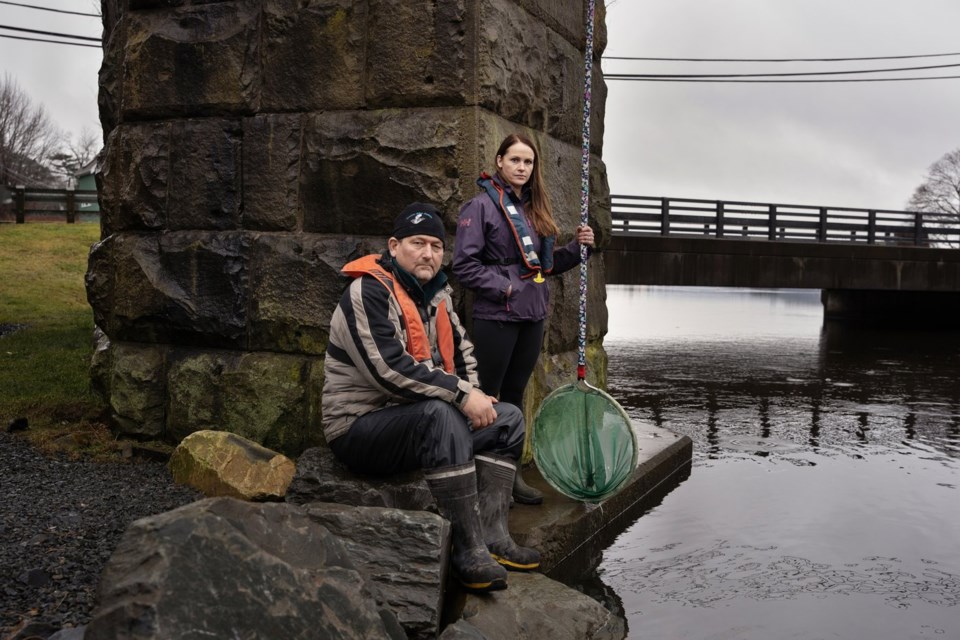HALIFAX — Ottawa has hatched a plan to redistribute the wealth of Nova Scotia's baby eel harvest from large licence holders to hard-working, individual fishers like Suzy Edwards and Mark Weldon.
But there's a snag: some would-be recipients of the eel quota say the proposal is unfair, unworkable and unwanted.
Standing by a tidal river on the outskirts of Halifax where the tiny, translucent eels known as elvers migrate in the spring, Edwards said this week she was content as an employee of Atlantic Elver Fishery. Her employer based in southern Nova Scotia is one of the nine commercial licensees that stand to lose between 60 per cent and 90 per cent of their quotas.
"It's going to break up a wonderful team who are almost like family," Edwards said. "We're not going to get a good price, because there's going to be a lot of competition and fewer buyers."
Under the federal Fisheries Department's proposal released earlier this month, 27 per cent of the total Maritime catch of about 10,000 kilograms would shift to 120 people who had been working for the licensees. A further 1.5 per cent of the lucrative catch would go to 30 harvesters of adult eels.
Edwards, a social worker who shifted to fishing 14 years ago, said she may have no choice but to accept the quota of 22 kilograms to help support her family. "It's not what I want," she added. "If they said I could give my quota to Atlantic Elver Fishery and fish for them, that's what I would do."
The Fisheries Department said in an emailed statement Friday that the elver fishery "presents a unique opportunity to broaden the distribution of prosperity potentially including young harvesters, employees of existing commercial licence holders, and harvesters who participate in co-operative commercial enterprises.
The email from spokeswoman Megan Gallant noted the participants in the industry had until Dec. 16 to provide feedback on the Dec. 5 proposal and their submissions are being reviewed.
However, Edwards and Weldon said they're now faced with problems that don't have simple solutions, such as a lack of holding tanks to keep their wriggling catch alive, uncertainty over the price they will receive and a lack of clarity over which rivers they will have access to.
After they're caught, the elvers must be kept in containers of aerated water — with backup electrical systems in case of power outages — that keep them alive. They are shipped live to nations such as Japan and China where they are grown into food by aquaculture operations.
At times in the history of the industry, a catch of 22 kilograms might have been a viable living, when prices reached between $4,000 and $5,000 per kilogram. But the value of elvers can fluctuate wildly, Weldon said.
"It goes up and down just like a thermometer and when you have all these new random people fishing, the price goes down in the basement between $1,500 and $700 a kilogram," he said.
"I want to stay working for Atlantic Elver Fishery, because they take great care of us. It's safer .... Ottawa giving me 22 kilograms is just putting me out there by myself along with 120 other new fishers and all the random people who just show up at the rivers," said Weldon, who estimates that it would cost close to $20,000 to create a system to hold his catch.
Tension over the fishery led to violence on the province's rivers this spring, including accusations of assault and shots fired. As a result, the season was closed in March, soon after fishing had begun. The co-workers said there have been times over the past five years when as many as 60 fishers — many without licences — jostled for position on waterways where they both once worked in peaceful solitude.
Weldon also says he feels uneasy about accepting quota that used to go to his employer, saying the company's founders deserve credit for developing the Asian market.
Genna Carey, the manager of Atlantic Elver and daughter of its founder, said in an interview Thursday that with the company's catch limit potentially set at 228 kilograms, down 80 per cent from 1,200 kilograms in 2022, she'll only be able to keep on a few of her 18 regular employees.
In addition to shifting elver quota from companies to employees, the proposed changes would give about half the total quota to First Nations fishers. The Indigenous fishers have noted that under a 1999 Supreme Court of Canada decision, they have treaty rights to a moderate livelihood fishery. There has been no compensation presented by Ottawa for the licence holders whose quotas are cut.
Carey described Ottawa's proposals as "deeply disheartening." Fisheries Minister Diane Lebouthillier "has not done her research, nor has our regional DFO office," Carey said. "There's been no assessment to see how the wealth is currently distributed and where the benefits of the fishery are landing."
When elver prices were high, Carey said, some of her employees were "in the top 20 per cent of Canadian income earners" — which means earnings over $100,000, according to 2022 Statistics Canada figures.
She said Ottawa needs to rethink its plan, compensating licence holders for quota they're losing and not forcing her employees to become her competitors. And there needs to be better reporting and monitoring of catches and stronger enforcement from the Fisheries Department.
As it stands, the minister has created a system "set up to fail," she said, predicting that hundreds of new entrants will crowd the rivers, prices are likely to plummet, and chaos on the province's rivers will resume.
This report by The Canadian Press was first published Dec. 20, 2024.
Michael Tutton, The Canadian Press




